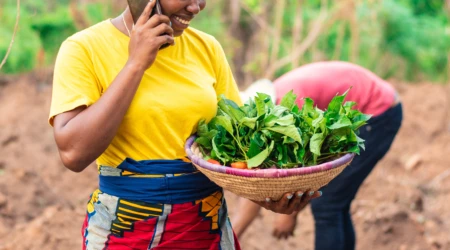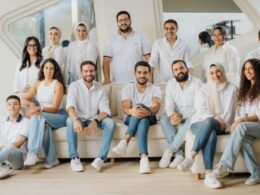There’s something almost magical happening in Tunisia right now. In a country better known for its Mediterranean beaches and ancient ruins, a different kind of transformation is taking place—one involving millions of tiny workers consuming organic waste and producing the protein that could help feed the world.
The workers? Black Soldier Fly larvae. The vision? A €18 million bet that insects can solve one of humanity’s most pressing challenges: how to produce enough protein for a growing planet without destroying it in the process.
The Call That Changed Everything
When Claire Van Enk, Anouk Boertien, and Zara Benosa founded nextProtein in 2021, they weren’t dreaming small. They saw a broken food system—one where millions of tons of perfectly good organic material rotted in landfills while farmers struggled to afford protein-rich feed for their animals. Meanwhile, our oceans were being stripped of wild fish to feed farmed fish, and rainforests were being cleared to grow soybeans for livestock.
The problem seemed insurmountable. The solution, as it turned out, had been around for millions of years.
“Nature already figured this out,” Van Enk might have told early investors. “Black Soldier Fly larvae have been converting organic waste into protein since long before humans existed. We’re just giving them the right environment to do it at scale.”
Fast forward to today, and that vision just received its biggest validation yet: €18 million in Series B funding co-led by Swen Capital’s Blue Ocean Fund and British International Investment (BII), the UK’s development finance institution. With an additional €4 million in debt financing, nextProtein is about to build something unprecedented—Africa’s largest Black Soldier Fly production facility.
The Unlikely Heroes: Meet the Black Soldier Fly
If you’re imagining something sinister when you hear “soldier fly,” let that go. These insects are nothing like the pests that plague picnics or spread disease. In fact, Hermetia illucens—to use their proper name—are remarkably benign creatures.
Adult Black Soldier Flies don’t even eat. They live for just a few days, focused entirely on reproduction. They don’t bite, don’t sting, and actively avoid humans. You could say they’re the introverts of the insect world—preferring to stay out of sight and out of mind.
But their larvae? That’s where the magic happens.
Picture this: A Black Soldier Fly larva, smaller than your fingernail, can consume twice its body weight in organic waste every single day. Food scraps, agricultural byproducts, market waste—materials that would otherwise rot and release methane into the atmosphere—become a feast for these voracious little creatures.
And here’s the remarkable part: as they eat, they grow. Within 10-14 days, they transform from tiny hatchlings into plump larvae packed with 40-45% protein and 30-35% fat. Then they’re ready for harvest.
“It’s like having millions of tiny recycling machines,” explains the science. “Except instead of just processing waste, they’re creating something incredibly valuable in the process.”
Inside the Facility: Where Waste Becomes Wealth
Walking through nextProtein’s planned Tunisia facility—once construction is complete—will be like entering a different world. Imagine rows upon rows of climate-controlled chambers, each one humming with life invisible to the naked eye but collectively representing the future of sustainable protein.
The process starts with breeding chambers where adult flies mate and lay eggs. Females deposit their eggs in designated areas, then their work is done. Those eggs—thousands upon thousands of them—are carefully collected and moved to hatching areas.
Once hatched, the real transformation begins. The larvae are transferred to rearing systems—essentially specialized containers where they receive their daily meals of agricultural waste and food industry byproducts. The waste that Tunisia’s farmers and food processors would normally pay to dispose of becomes free raw material for protein production.
For nearly two weeks, the larvae eat and grow. Automated systems deliver fresh organic material. Sensors monitor temperature and humidity. And the larvae do what they do best: consume and convert.
Then comes harvest day. The mature larvae are separated from their substrate, processed, and transformed into three distinct products:
nextMeal: A protein-rich powder that rivals fishmeal in nutritional quality but doesn’t require catching a single wild fish.
nextOil: A fatty extract rich in lauric acid and customizable omega fatty acids—perfect for animal feeds.
nextGrow: The leftover material, transformed into organic fertilizer that returns nutrients to the soil.
Nothing is wasted. Every input becomes a valuable output. It’s the circular economy in its purest form.
The Tunisia Advantage: Why Here, Why Now
Tunisia wasn’t chosen by accident for this ambitious expansion. While Silicon Valley gets the tech headlines and Nairobi claims East Africa’s innovation crown, Tunisia has been quietly building something special—a bioeconomy hub positioned at the crossroads of Africa, Europe, and the Middle East.
The country’s Mediterranean climate provides ideal conditions for year-round insect production without excessive heating or cooling costs. Its proximity to European markets—just across the Mediterranean from major aquaculture and livestock feeding operations—cuts transportation time and costs dramatically.
But geography is only part of the story. Tunisia’s education system produces thousands of technically trained graduates annually—engineers, biologists, and technicians who can operate sophisticated biotech facilities. The government has embraced innovation as a national priority, creating a supportive regulatory environment that facilitates rather than frustrates entrepreneurship.
And then there’s the feedstock. Tunisia’s thriving agricultural sector—producing everything from olive oil to dates, citrus to cereals—generates exactly the kind of organic byproducts that Black Soldier Fly larvae thrive on. What’s considered waste in traditional systems becomes the foundation of nextProtein’s value creation.
“When we looked at potential locations,” a company spokesperson might explain, “Tunisia checked every box. Climate, location, talent, regulations, feedstock availability—everything aligned.”
The new facility will be nextProtein’s largest yet, capable of producing thousands of tons annually of sustainable protein products. More importantly, it will demonstrate something many doubted was possible: that insect-based protein can scale to compete with commodity feeds on both quality and price.
The Investors Who Bet on Bugs
Not everyone would write an eight-figure check for a company farming insects. But the investors backing nextProtein’s Series B aren’t your typical venture capitalists looking for the next social media app.
Swen Capital’s Blue Ocean Fund invests specifically in sustainable aquaculture and marine protein solutions. They’ve seen firsthand how traditional fish farming creates an absurd paradox: we catch wild fish to feed farmed fish, meaning aquaculture sometimes increases rather than decreases pressure on ocean ecosystems. For Blue Ocean, nextProtein represents a solution to this fundamental problem.
British International Investment (BII), meanwhile, brings 75 years of experience investing in African development. As the UK’s development finance institution, BII looks for companies that generate both financial returns and measurable social impact—job creation, food security improvements, climate action, and economic development.
“This isn’t about making a quick return,” a BII representative might say. “It’s about building sustainable industries that can provide employment, improve food security, and demonstrate that Africa can be a leader in the technologies that will feed the world’s future.”
The €4 million in debt financing adds another dimension—demonstrating that banks now view insect protein facilities as bankable infrastructure projects, not just speculative ventures. It’s a vote of confidence in the sector’s maturation.
The Problem nextProtein is Solving
To understand why investors are excited, you need to grasp the scale of the problem nextProtein addresses.
Every year, roughly one-third of all food produced globally never reaches a human stomach. In Africa, post-harvest losses often exceed 40%. Meanwhile, our oceans are being depleted—many fish stocks have collapsed, yet we continue grinding up wild fish to feed farmed fish and livestock.
At the same time, global protein demand is surging. By 2050, we’ll need to feed 10 billion people who will collectively consume more meat, fish, and dairy than any previous generation. The math doesn’t work using conventional approaches.
Traditional protein sources face insurmountable constraints:
Fishmeal requires catching wild fish, but fish stocks are declining. The industry is literally running out of raw material.
Soybean meal is driving deforestation in the Amazon and other critical ecosystems. Every hectare planted means another hectare of rainforest lost.
Livestock production generates massive greenhouse gas emissions while requiring enormous quantities of land, water, and feed.
We can’t scale our way out of this crisis using 20th-century solutions.
Enter the humble Black Soldier Fly larva. These insects convert organic waste into protein with extraordinary efficiency:
- 2-3 times more efficient than chickens
- 5-10 times more efficient than cattle
- 10-14 day production cycle versus months or years for conventional livestock
- Minimal land requirements through vertical farming approaches
- No antibiotics or hormones needed
- Dramatically lower greenhouse gas emissions
And they do all this while consuming materials that would otherwise create disposal problems and environmental pollution.
From Niche to Mainstream: The Commodity Competition
Here’s where nextProtein’s story gets really interesting. Many sustainable alternatives remain trapped in premium niches—great for conscious consumers willing to pay extra, but unable to achieve the scale necessary to truly transform industries.
nextProtein has different ambitions. The company explicitly aims to “compete with traditional commodities”—achieving price parity with fishmeal and soybean meal so that customers choose insect-based ingredients for economic reasons, not just environmental ones.
This is the Holy Grail of sustainable protein. If nextProtein succeeds, aquaculture and livestock producers won’t need to choose between profitability and sustainability. The sustainable option will simply be the better business decision.
The Tunisia facility is designed specifically to achieve this commodity competition through:
Scale: Fixed costs spread across massive production volumes drive down per-unit costs.
Near-Zero Input Costs: Agricultural and food waste that companies currently pay to dispose of becomes free (or even revenue-generating) raw material.
Process Efficiency: Years of optimization have improved feed conversion ratios, reduced mortality, and increased throughput.
Full Product Valorization: Monetizing protein, oil, and fertilizer from each production cycle improves overall economics.
Geographic Advantages: Tunisia’s cost structure and market proximity reduce both production and distribution costs.
As these factors combine at scale, nextProtein moves closer to the inflection point where insect protein becomes not just viable but preferred by cost-conscious customers.
The Ripple Effects: Beyond nextProtein
This story isn’t just about one company or even one industry. nextProtein’s success would create ripple effects across multiple dimensions:
For Africa’s Innovation Ecosystem
Africa has often been positioned as a recipient of technology rather than a creator of it. nextProtein’s Tunisia facility challenges this narrative, demonstrating that cutting-edge biotech can not only operate but thrive on the continent.
The facility will create hundreds of direct jobs in operations, quality control, logistics, and management—skilled positions that build technical capabilities across Tunisia’s workforce. Thousands more indirect jobs will emerge in feedstock collection, transportation, and support services.
For Global Food Security
Every ton of nextProtein’s products that replaces fishmeal means wild fish left in the ocean to maintain ecosystem health and support subsistence fishing communities. Every ton that replaces soy-based feed is a hectare of rainforest that doesn’t need to be cleared.
At scale, insect-based proteins could help break the vicious cycle where meeting protein demand destroys the very ecosystems we depend on for future food production.
For Climate Action
Food systems generate roughly one-third of global greenhouse gas emissions. The protein component—particularly livestock production and land-use change for feed crops—accounts for a significant portion of this impact.
nextProtein’s process dramatically reduces emissions compared to conventional protein production. The company likely tracks tonnes of CO2-equivalent emissions avoided—metrics that matter increasingly to customers, regulators, and consumers.
For the Circular Economy
Perhaps most fundamentally, nextProtein demonstrates what circular economy approaches look like in practice. Instead of a linear system where we extract resources, use them, and dispose of waste, we create closed loops where waste from one process becomes input for another.
Organic byproducts → Black Soldier Fly larvae → Protein for animal feed → Animals that feed humans → Organic waste that starts the cycle again.
It’s regenerative rather than extractive, and it proves that business models can be both profitable and restorative.
What Could Go Wrong?
No story this ambitious unfolds without challenges. nextProtein faces several significant hurdles:
Scaling Production: Moving from pilot operations to industrial scale is where many promising technologies stumble. Will the larvae perform as well at massive scale? Can quality control maintain consistency across thousands of tons?
Market Development: Convincing conservative aquaculture and livestock producers to switch from familiar ingredients to insect-based alternatives requires extensive relationship-building, product demonstrations, and potentially long sales cycles.
Regulatory Navigation: While regulations are becoming more favorable, food safety requirements remain stringent—particularly for products destined for European markets. One contamination incident could set the industry back years.
Economic Viability: The ultimate test is whether nextProtein can truly achieve cost parity with commodity feeds. If customers must pay a premium for sustainability, adoption will remain limited.
Competition: Success attracts competition. Other insect protein companies are scaling operations worldwide. nextProtein needs to build defensible advantages—whether through technology, scale, location, or customer relationships.
The Road Ahead: Building the Future
With €18 million in fresh capital, nextProtein enters perhaps its most critical phase. The next 18-24 months will determine whether the vision becomes reality.
Construction begins soon on the Tunisia facility—months of engineering, permitting, building, and equipment installation. Then comes the delicate work of commissioning—testing systems, optimizing processes, achieving regulatory approvals, and ramping up to commercial production.
Parallel to construction, the commercial team will be securing customers and partnerships—engaging with major aquaculture feed producers, livestock operations, and pet food brands. Long-term supply agreements provide the revenue visibility that makes subsequent fundraising and expansion possible.
The technical team will continue refining processes—improving feed conversion ratios, reducing mortality, enhancing automation, and driving down costs toward that elusive commodity price point.
And throughout, the leadership team will be building organizational capacity—recruiting operational talent, developing management systems, creating company culture, and preparing for the next stage of growth.
If all goes well, this facility becomes proof of concept for a model that can be replicated across Africa and beyond. Series C funding enables additional facilities in other regions. The company expands from Tunisia to Egypt, Morocco, Kenya, South Africa—anywhere with abundant organic waste, growing feed demand, and supportive conditions.
A Vision Larger Than Profit
What makes nextProtein’s story compelling isn’t just the business opportunity—though that’s substantial. It’s the vision of a fundamentally different relationship between human economic activity and the natural world.
For most of human history, economic development meant extracting more from nature—more fish from oceans, more land for agriculture, more resources to fuel growth. This extractive model produced remarkable prosperity but at enormous ecological cost.
The regenerative economy that nextProtein represents flips this equation. Economic success comes not from taking more but from using what we have more intelligently. Waste becomes resource. Problems become opportunities. Growth happens not despite environmental limits but by working with natural systems rather than against them.
Three women founders in 2021 saw that possibility. Today, with Africa’s largest insect protein facility under construction, that vision moves closer to reality.
The larvae quietly consuming organic waste in Tunisia may not look like revolutionaries. But in their own small way, they’re part of rewriting the future—transforming how we feed ourselves while healing rather than harming the planet we call home.












